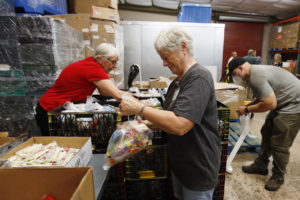
When people are healthy and well, they can better contribute to the good of their family and society.
Q: What is community health?
A: Simply put, community health is the physical and mental well-being of people in a specific place. We look at the community health of Northern Arizona as a whole, but also dive in closer to look at the health and well-being of people in a particular neighborhood or town. Many indicators can measure aspects of community health. One indicator would be the number of health screenings received by members of a community each year. Another would be a community’s access to nutritious food and clean water. Another would be access to preventive care and health education. These and other factors can inform us about the health of a community and its members.
Q: Why should we care about community health?
A: Good health supports a full and thriving life for individuals and communities. When people are healthy and well, they can better contribute to the good of their family and society. We care about community health because individual lives and the vitality of our communities are at stake.
Q: What is the ideal for community health?
A: A healthy community is where all people have ready access to quality education, adequate employment, quality health care, safe home and work environments, and built environments like parks, paths, trails and sporting fields that promote outdoor activity and socialization. These broad categories are known as the social determinants of health. Communities that excel in these areas tend to thrive and prosper. Shortcomings in any of these areas can lead to faltering health and unhealthy environments.
Q: What is an example of a social determinant that affects health in Northern Arizona?
A: Location, or where one lives, can affect health. Many residents in our region live in rural areas, which can offer health benefits. For instance, people in rural areas tend to have less stress and less respiratory disease. However, rural residents often live far from essential goods and services, like nutritious food and health care. One factor contributing to higher death rates from accidents in rural Arizona is the distance to emergency services. Also, many rural residents will forgo routine health checkups, dental care and mental health care because of a lack of health professionals and facilities in their immediate area.
Q: How does Health First Foundation help?
A: Health First Foundation works with community and non-profit partners, funding innovative and impactful initiatives that address the region’s top health needs. Each year, it awards Northern Arizona Community Health Grants to the most promising programs for improving health in our five counties – Yavapai, Mohave, Coconino, Apache and Navajo. The foundation also awards special grants when circumstances warrant them. For instance, it awarded $100,000 in grants to Navajo and Hopi non-profits for pandemic mitigation last year. To date, Health First Foundation has invested $17 million in improving health. Those dollars have had a direct positive impact on the health of more than 500,000 people. That’s about a $34 investment in the health of each person. Wouldn’t you give $34 to make a positive impact on the health of a family member, friend or someone in your community?
Q: How do you know those numbers?
A: The foundation closely tracks the impact and results of each program it funds. And even more people benefit from the foundation’s work. When one person achieves optimal health, it tends to have a positive ripple effect on family members and the community. That’s the goal: keep working to improve health and well-being until there is sustainable vitality in every corner of every community in Northern Arizona.
Q: How can people become involved?
A: Put health first in your daily life and inspire others to make health a priority. The bottom line: We cannot achieve our full potential without good health. You also can join the foundation and its partners in making health a priority by volunteering or giving to the Health First Community Fund. FBN
By Deirdre R. Meldrum
Dr. Deirdre R. Meldrum, Ph.D., is the Distinguished Professor of Biosignatures Discovery at Arizona State University, director of the Center for Biosignatures Discovery Automation, and a tenured full professor of electrical engineering in the Ira A. Fulton Schools of Engineering. She is a Fellow of the National Academy of Inventors for her significant innovations in healthcare technology. Dr. Meldrum also is vice-chair of the Health First Foundation Board of Directors. The Health First Community Fund is a comprehensive campaign to improve health in our region. To learn more about the fund or to donate, visit the Health First Foundation website, healthfirstforall.org.







